COVID-19 survivors talk about challenges to recovery months after contracting virus
"I still have nerve damage in both hands, in both arms."
The families of Raul Pero and Titou Phommachahn are glad to have them back home after hard-fought battles against COVID-19. Yet, months after they began their recovery, both survivors are still grappling with the long road to recovery.
"I still have nerve damage in both hands, in both arms. … I'm still weak," Pero, of Denver, Colorado, told "Nightline." "But also, I feel electric shocks down from my elbow to my fingers."
Pero and his husband, Aaron Giuseffi, started feeling symptoms of the virus around the same time. But as Giuseffi began feeling better, Pero continued to struggle with a high fever.
"I was burning. It was a really high fever," said Pero. "I remember putting ice packs all around my body to try to break the fever, and then maybe I'd feel good for half an hour, and then it went up again."
Pero, a 39-year-old who had no preexisting conditions, was admitted to the intensive care unit (ICU) at UCHealth in Colorado two days after entering the hospital, on the day that the couple planned to go hiking to celebrate their second wedding anniversary.
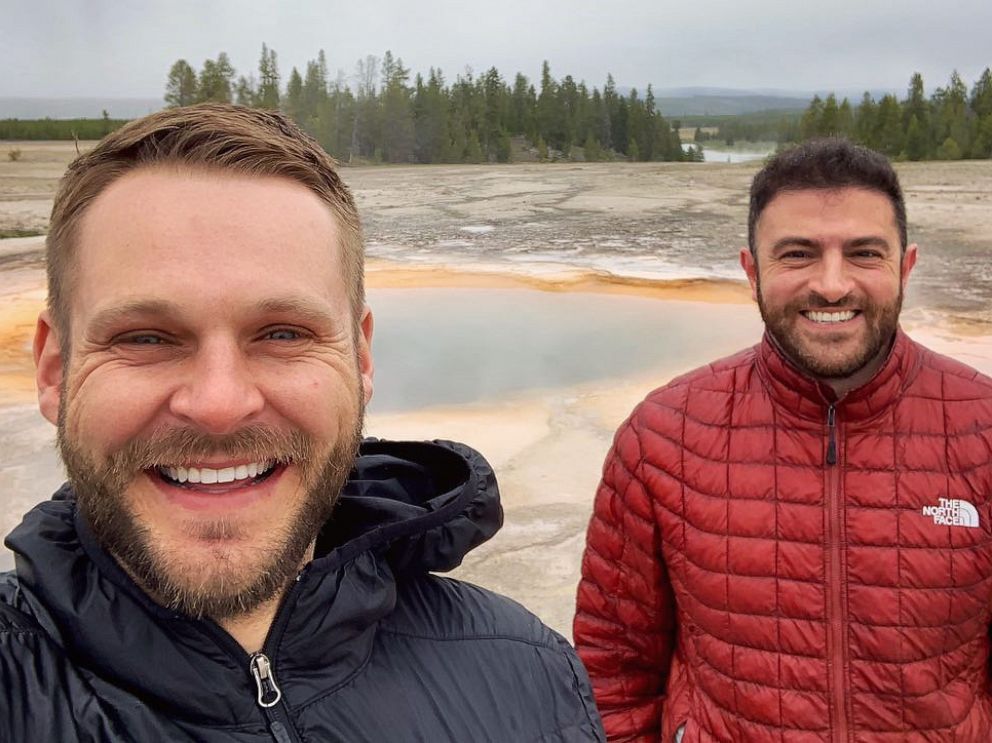
Pero's story is one of many COVID-19 survivors who, upon recovering from the infection, are only beginning their journey of recovery. As the coronavirus rages on throughout parts of the United States, over 160,000 Americans have died and thousands of survivors have been left reporting lingering symptoms including nerve pain, blurred vision and hair loss, among others.
Pero spent 30 days on a ventilator with pneumonia in both his lungs. When doctors removed him from the ventilator, Pero said he "had no idea" what day it was.
"I freaked out because a lot of time had passed," he said, adding that he was nervous "because I had my interview for citizenship that was scheduled for April 14. And I was like, 'Oh my God, I cannot believe I missed it.'"
Pero, however, couldn't speak and was barely able to move in those first few days after being woken up. With COVID-19 restrictions in the hospital preventing his husband from seeing him in-person, the two spoke through FaceTime.
"That was always amazing because I was getting to see him, but it was terrifying and horrible because I was seeing my husband, who had lost 50 pounds," Giuseffi told "Nightline." "He looked gaunt. He looked sick. He couldn't move. And so, you're trying to be as strong as possible for him and not convey, 'Hey, I'm worried,' at the same time.'"
Having already missed his wedding anniversary because of the virus, Pero was determined not to miss another special occasion: his husband's birthday. Dr. Bill Niehaus, one of the doctors who helped Pero through rehab, spoke about his focus during recovery.
"He woke up just a few days before he came to rehab and really started to put together all the things that had happened to him, and from the get-go, he had this fire to get home," Niehaus told "Nightline." "That is inspiring to see as a rehab doctor. He had no qualms about what was going to be needed to get him home."
Pero said he was "ready" to get through this last step to get back home.
"I made my goal that I want to be home by [my husband's] birthday, which was May 10," he said, adding that "everybody felt that was very encouraging, that I had a date in mind."
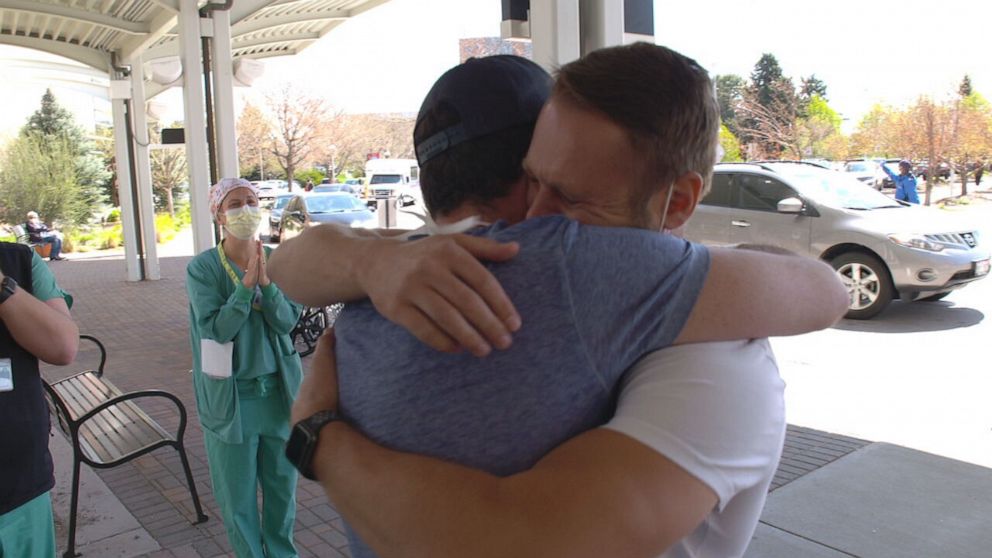
Pero was discharged from the hospital on May 8 to a chorus of cheers from the staff that treated him. Rather than leaving in a wheelchair, he said he wanted to walk out just like he'd come in.
"I'm not going to lie, I cried a lot, because, I mean, [they're] wonderful people," Pero said of the hospital staff. "They were my family those seven weeks that I was in the hospital. … My cheerleaders."
Outside of the hospital, Giuseffi was waiting with open arms. He said it felt "unbelievable" and "better than you could ever imagine" to be with his husband again.
"You lost your other half for however long, and you didn't know when you were going to get him back," Giuseffi said. "You didn't want to let him out of your arms and keep him. … And I still feel that way. There's nights that I wake up in bed and roll over to make sure he's alright. This changed it. You just realize how fragile this is and those things I took for granted."
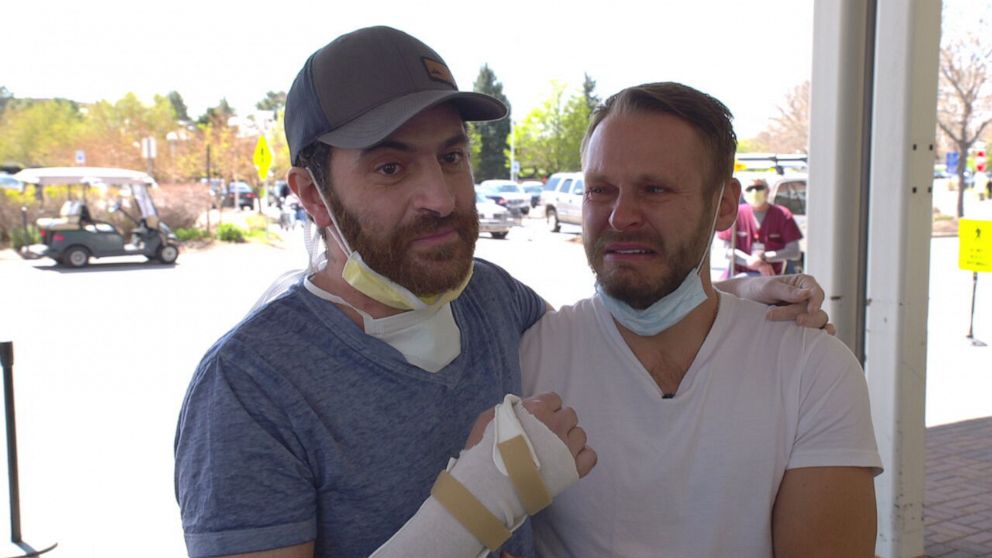
Pero didn't expect his return home to be so challenging. He said those first weeks home were the most difficult part of recovery for him, dealing with nerve damage and pain medications wearing off.
"That was just the start of the battle," said Giuseffi. "He looked great walking out the door of the hospital, but that was just the beginning of his rehab."
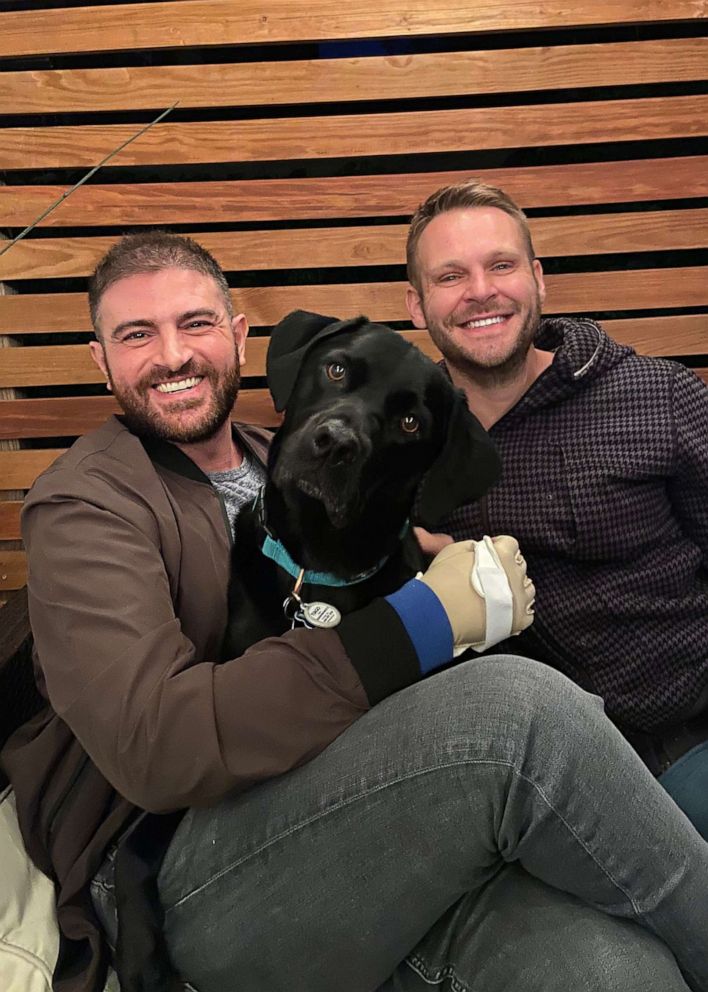
Like Pero, Phommachahn has also faced a tough recovery after leaving the hospital.
Phommachahn, who is the director of catering at the Capital Hilton in Washington, D.C., said he started feeling sick while at work on March 4. He eventually sought treatment at Inova Hospital in Fairfax, Virginia. Within 24 hours, his condition had worsened enough that he was sent to the ICU and placed on a ventilator. It wasn't until later that his illness was confirmed to be COVID-19.
Over the next week, Phommachahn's condition continued to worsen. In the early stages of the pandemic, Phommachahn was the first person in his hospital to be treated with the experimental Ebola drug remdesivir. But within a week of arriving at the hospital, his condition had gotten so bad that doctors had to put him on an ECMO machine, which helps to oxygenate blood by circulating it through an artificial lung, thereby giving the heart and lungs time to rest.
His wife, Amanda Phommachahn, told "Nightline" on the day she reunited with Titou Phommachahn in early April that there were a few days "we were pretty sure he wasn't going to make it." At the time, she said doctors had told her he "was kind of hanging onto life for about two weeks."
Titou Phommachahn said that when he finally reunited with his daughters, he told them he loved them and that he was "fighting to come back to them."
"That's all I wanted when I was in the hospital was to get out," he said. "If I was going to go, it wasn't going to be in the hospital. So, every day was, for me, it was like a fight to get out so I can get home."
While the doctors' aggressive approach to treating Phommachahn worked, later on in April he said there were still physical and mental challenges he'd been dealing with during rehab.
"The biggest thing is the mental thing of it all," he said in April. "There's a lot of blurry memories, flashbacks to near-death experiences. I'm talking to a therapist in regard to that. … I want to be here for my kids and my wife -- that's why I'm working so hard. I need them as much as they needed me. One day at a time, getting a little stronger each day."
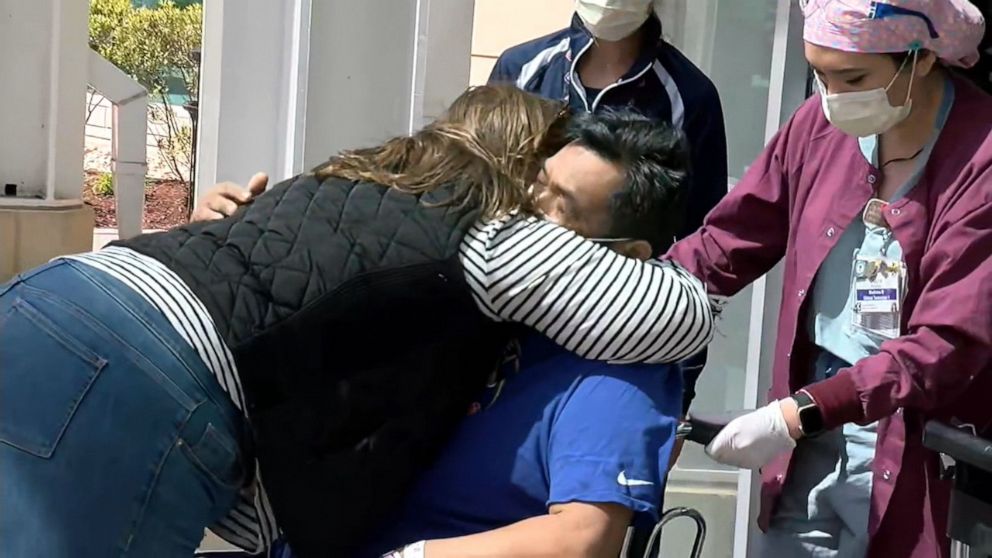
At the end of July, Phommachahn had his first follow-up visit with his doctors since he was discharged from the hospital. Doctors had feared his lungs would be permanently scarred by the virus, but an X-ray showed they had fully healed.
Phommachahn says he still deals with nerve pain, specifically "pins and needles," in some of his fingers all the way up to his elbow, and that he wakes up in the morning feeling like his arms are still asleep. Yet, both he and his doctors are encouraged by how far he's come, he said.
"It's really remarkable. The sort of side effects I have right now [are] really minimal to what I went through," he said.
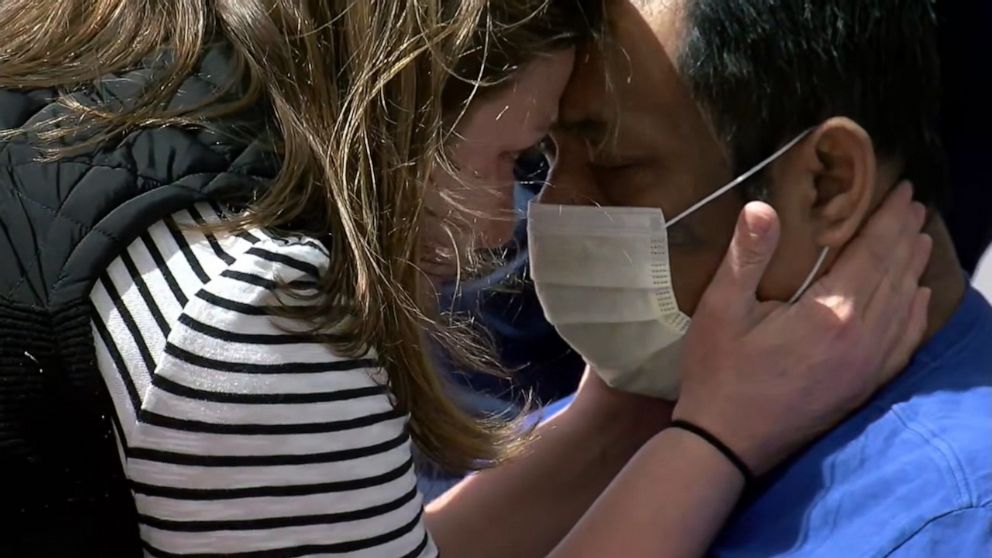
"'Remarkable' is like the best word -- almost surreal," Amanda Phommachahn added. "We're so fortunate. But I also know that his case is very much the exception to the rule. So it's kind of fantastic for us in our case. But I know it's not the case for so many to not have the side effects and long-term damage."
After he left the hospital, Titou Phommachahn went through six weeks of physiotherapy and occupational therapy to regain his ability to walk. Since then, he says he's been keeping himself busy with exercise -- swimming, particularly -- because it has helped his pain.
Both he and Amanda Phommachahn say their experience made them appreciate their friends and family more. With everyone at home amid the pandemic, he says it's felt sort of like an extended vacation, allowing him to spend time with his three daughters.
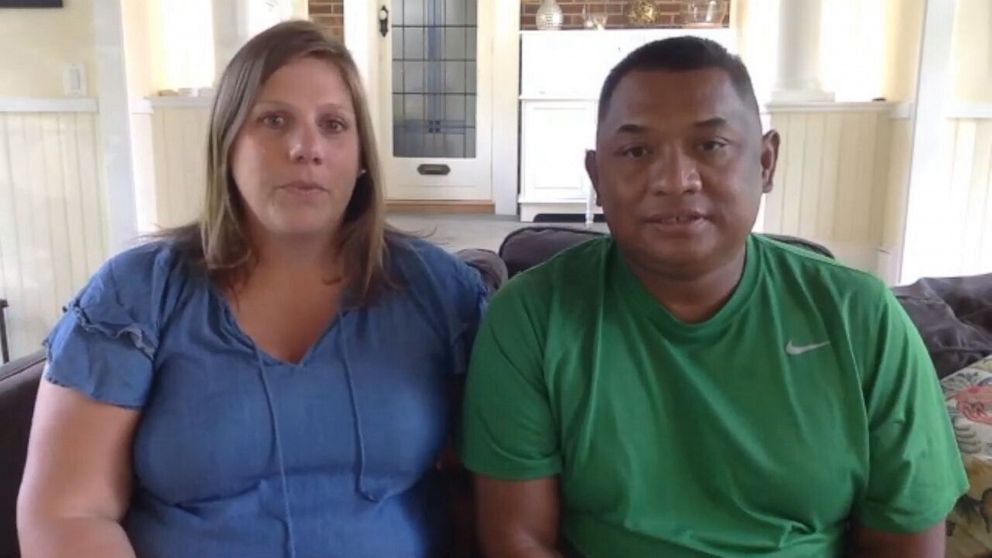
"I can see them and have breakfast with them. I've seen my oldest daughter being able to grow up. … I would never normally get to see, so now I get to see them and sort of experience a lot of these things that have sort of happened behind my back in a sense," he said.
But he also lamented the way in which the virus has further divided the country.
"In the end of it, we should all appreciate one another, because nobody knows when your days on earth will end," he said. "I'm just grateful that we have the opportunity to continue sort of being with one another."




